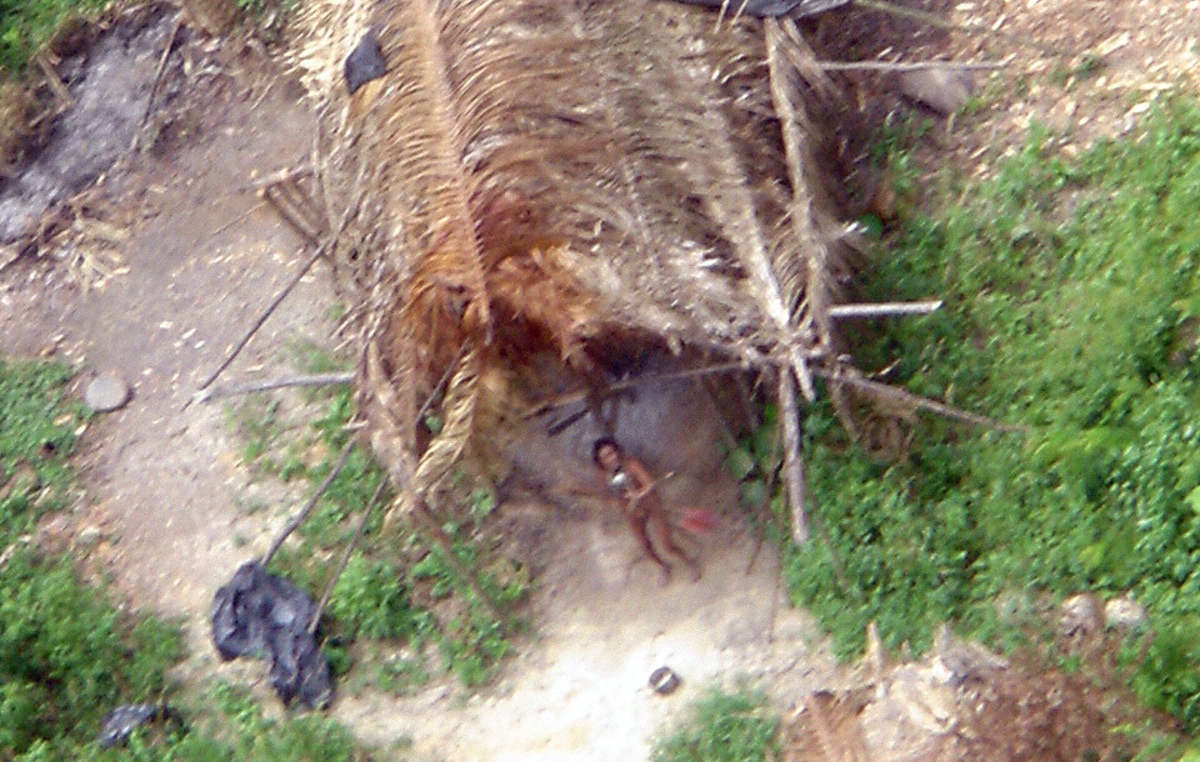
by DGR News Service | Oct 21, 2020 | Agriculture, Biodiversity & Habitat Destruction, Colonialism & Conquest, Indigenous Autonomy
Communal house of uncontacted Indians inside the Uru Eu Wau Wau territory, photographed in 2005. © Rogério Vargas Motta/IBAMA (Brazilian Institute of Environment and Renewable Natural Resources).
Survival International / October 14, 2020
The survival of several uncontacted tribes is now at risk after fires were set inside their territories. Activists have described this year’s Amazon fires, and President Bolsonaro’s war on indigenous peoples, as “the gravest threat to the survival of uncontacted tribes for a generation.”
Four tribal territories face an especially serious crisis:
– The famed Papaya Forest on Bananal Island, the world’s largest fluvial island. It’s inhabited by uncontacted Ãwa people. Eighty per cent of the forest burned in fires last year – fires have been seen this year in one of the last areas of intact forest. More than 100,000 head of cattle now graze on the island.
– The Ituna Itatá (“Smell of Fire”) indigenous territory in Pará state, inhabited exclusively by uncontacted Indians. This reserve was the most heavily deforested indigenous territory in 2019, as land grabbers and cattle ranchers invaded. In the first four months of 2020, another 1,319 hectares of forest were destroyed, an increase of almost 60% compared to the same period last year.
– The Arariboia territory in the eastern Amazon state of Maranhão: uncontacted Awá inhabit this territory, which has already been extensively invaded. Amazon Guardians of the neighboring Guajajara tribe are warning daily that illegal loggers are destroying the forest at alarming rates. (The Ãwa people of Bananal Island and the Awá tribe of Maranhão state are distinct peoples).
– The Uru Eu Wau Wau territory. Uncontacted Indians inside this territory shot and killed famed Amazon expert Rieli Franciscato last month – campaigners fear the group is being forced out of the forest by the invasions.
Many of the fires are being started to clear the rainforest for logging and ranching, and millions of tons of soya, beef, timber and other products are imported into Europe and the US each year.
APIB (the Association of Indigenous Peoples of Brazil) has launched a campaign to highlight the links between Bolsonaro, his agribusiness backers, and the genocidal violence being committed against indigenous peoples across the country. They are asking people and companies around the world to stop buying products that are fuelling the destruction of their territories.
Survival has launched a global action calling on supermarkets in Europe and the US to stop buying Brazilian agribusiness products until indigenous rights are upheld.
Ângela Kaxuyana, spokesperson from COIAB, the Coordination of Indigenous Organizations of the Brazilian Amazon, said: “Land grabbing, deforestation and arson directly threaten the lives of our uncontacted relatives. The destruction of the territories that are their only sources of life, from where they obtain their food (fauna, flora and water), could end in their extermination.” “A grilagem de terra, o desmatamento e os incêndios criminosos ameaçam diretamente a vida dos nossos parentes em isolamento voluntário. A destruição dos territórios que são suas únicas fontes de vida, de onde garantem sua alimentação (fauna, flora e água), podem levá-los ao extermínio”.
Tainaky Tenetehar, one of the Guajajara Guardians who protect the Arariboia reserve for the Guajajara people and their uncontacted neighbors, said today: “We fight to protect this forest, and many of us have been killed doing so, but the invaders keep coming. They have damaged the forest so much in recent years that their fires are now much bigger, and more serious, than before, as the forest is so dry and vulnerable. The loggers must be evicted – only then can the uncontacted Awá survive and thrive.”
Survival’s Senior Researcher Sarah Shenker said: “In many parts of Brazil, uncontacted tribes’ territories are the last significant areas of rainforest left. Now they are being targeted by land grabbers, loggers and ranchers emboldened by Bolsonaro’s open support for them. Consumers in the US and Europe must understand that there’s a direct connection between the food on their supermarket shelves and this genocidal destruction – and act accordingly. Uncontacted tribes are the most vulnerable peoples on the planet, and at the same time nature’s best guardians, by far. We cannot let their land go up in flames.”
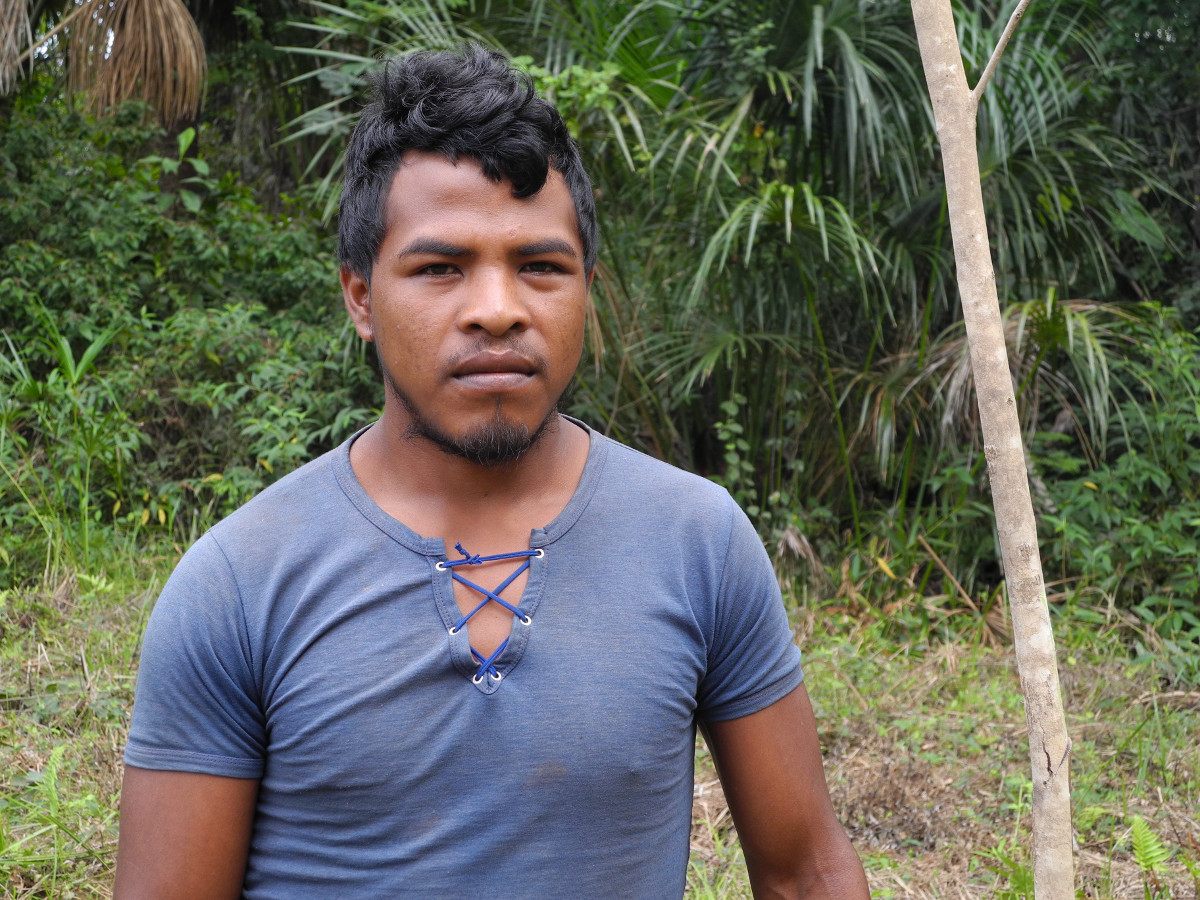
by DGR News Service | Nov 6, 2019 | Biodiversity & Habitat Destruction, Colonialism & Conquest, Defensive Violence, Direct Action, Human Supremacy, Movement Building & Support
Image: Sarah Shenker, Survival International
by Liam Campbell
Paulo Paulino Guajajara, known as Kwahu, has been murdered by loggers in a part of the Amazon currently occupied by the Brazilian government. Equipped with only rudimentary weapons and body armour, and lacking medical assistance, Rainforest Guardians like Guajajara regularly face death at the hands of both government officials and natural resource exploiters. Their only advantages are their intimate knowledge of the rainforest and their deep commitment to protecting those living systems. Guajajara was protecting both his own ancestral land and also the lands of their uncontacted neighbours, the Awá tribe, when he was shot and killed by assassins. Guajajara is not the first ecological activist to be murdered; in April, 3 Rainforest Guardians were similarly slain.
It’s difficult to write this article from the relative luxury and comfort of a Western European country, especially having experienced a small modicum of the difficulties of even living for a few days in jungles like the Amazon — let alone inhabiting those claustrophobic settings with the knowledge that well armed groups of men are hunting for you. I cannot even begin to imagine the courage Guajajara must have embodied in order to take on this critical work; ultimately these words are cheap compared to the very real actions of Rainforest Guardians. We must extend our support beyond words if we’re to meaningfully help them achieve their mission of protecting the world’s dwindling rainforests.
These courageous groups need funding for better defensive weaponry, body armour, combat medicine, training, and basic survival equipment. If we are unable or unwilling to put our own bodies on the front lines to protect nature, then we should share what resources we do have to protect the bodies of people who are willing to put their own lives at risk for the rest of us. Groups like Survival Interntional have a good reputation, or reach out to a Deep Green Resistance representative for additional recommendations.
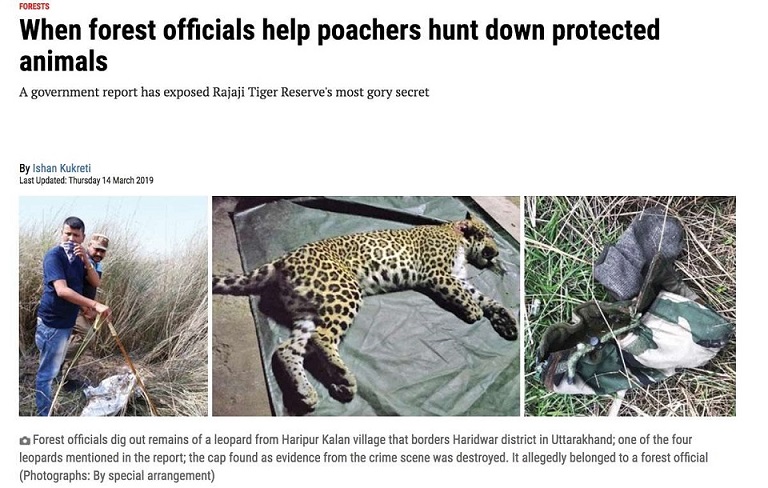
by Deep Green Resistance News Service | Mar 17, 2019 | Colonialism & Conquest
Featured image: The collusion between officials and poachers was exposed in India’s Down to Earth magazine. © Down to Earth
by Survival International
Park officials in India’s Rajaji Tiger Reserve colluded with poachers in the killing of endangered leopards, tigers and pangolin, according to an investigation by a senior wildlife officer.
The accused officials range from the park director to junior guards. WWF-India boasts that it trained “all Rajaji frontline staff in skills that were vital for protection,” including law-enforcement. It also provided vehicles, uniforms and essential anti-poaching equipment to the guards.
The investigation, reported in India’s Down to Earth magazine, found that not only were officials helping to hunt down and kill wildlife, they also beat and tortured a man named Amit – an innocent villager who was trying to stop the poaching.
Officials are reported to have arrested Amit under false charges, resulting in him being detained for up to a month. He was also beaten and given electric shocks by a wildlife warden and two range officers.
These revelations of serious human rights abuses by guards trained and supported by WWF follow the recent Buzzfeed exposés that WWF funds guards who kill and torture people.
The involvement of those supposed to protect wildlife in hunting is common. A UN report in 2016 confirmed that corrupt officials are at the heart of wildlife crime in many parts of the world, rather than tribal peoples who hunt to feed their families.
Stephen Corry, Survival International’s Director, said today: “Rangers who poach as well as violate human rights won’t surprise those environmentalists who’ve been speaking against fortress conservation for years. Corrupt rangers often collude with poachers, while tribal people, the best conservationists, bear the brunt of conservation abuses.”
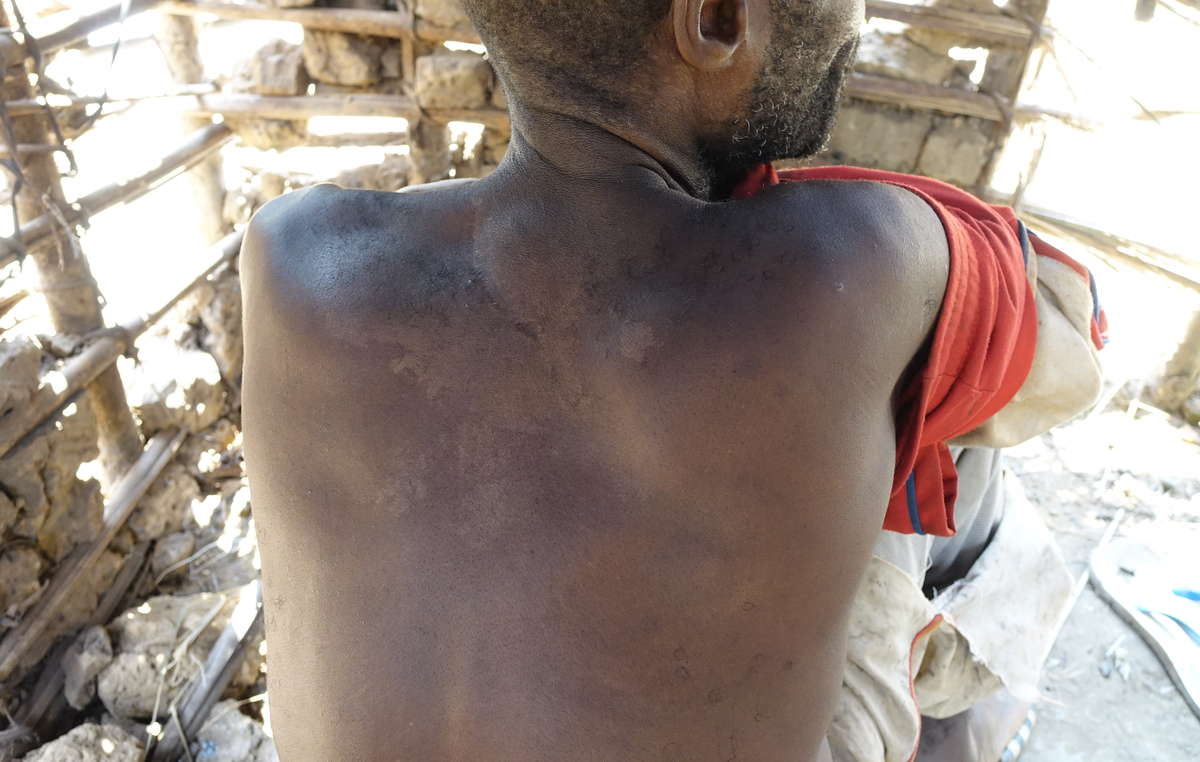
by Deep Green Resistance News Service | Mar 9, 2019 | Colonialism & Conquest
Featured image: A man from a village near the proposed Messok Dja national park shows scars from a beating he received at the hands of ecoguards supported and funded by World Wildlife Fund. © Fiore Longo/Survival International
by Gabriella Rutherford, Survival International / Intercontinental Cry
The dense Messok Dja rainforest has been home to the Baka Peoples since time immemorial. But now the forest is being closed off to them to make way for a new national park. Although the park hasn’t been formally established, the Baka are being driven from their homes and deprived of their vital lifeline of forest resources—with devastating results.
For nearly a decade, the World Wide Fund for Nature (WWF) has been working with the Congolese government to set up the Messok Dja National Park with the help of funding bodies like the European Commission (EC), the US Fish and Wildlife Service (USFWS) and the United Nations Development Programme (UNDP).
During this time, WWF-funded park rangers have actively patrolled the area. The Baka, who are vehemently opposed to the national park, have routinely denounced the rangers, whom they accuse of violence, discrimination and torture.
One Baka woman described how “The wildlife guards just want to kill us. Once, I had just gone to do some dam-fishing. I was coming back with some fish to grill in packages made of leaves, to eat with my husband and children. I’m coming back with the pot of fish, I put it down. Just like that, the ecoguards grab me: Bam, bam, bam. For no reason. I hadn’t provoked them, I didn’t owe them anything. They just beat me and I don’t even know what for.”
Another man reported, “We just suffer these terrible beatings here for nothing. If they see us, they just beat us with machetes. Bam, bam, bam [on your body].”
In 2011, park rangers operating in the area were involved in a string of events that led to the death of 10-year old Christine Mayi.
In the face of such persecution, many Baka have retreated from the forests to live in road-side camps. Already they are being forced to abandon their age-old tradition of “molongo” – going deep into the forest for extended periods to hunt and gather. This is now impossible as one Baka woman explained:
“How can I go into the forest?…I just go round in circles here. At this time of year I gather wild mangos, [but] now I just stay close to the road. I just gather the mangoes that are near here.. that’s their forest – they’ve taken it.”
Confronted with an alien way of life outside of the forest, the Baka face the very real possibility of food scarcity. “We live from the Lipolo forest: wild mangoes, fish, meat, wild honey and yams, everything… but it’s now blocked off and we’re left to suffer. We don’t know how we can live.”
Conservation-related malnutrition among tribal peoples in the Congo is already a well-documented problem. In 2017, a Congolese organization raised concerns that conservation had contributed to the deaths of several dozen Bayaka children during an epidemic in 2016. The deaths were attributed by a medical expert to malaria, pneumonia and dysentery, aggravated by severe malnutrition.
“We’re suffering here. We don’t know how we’re going to survive. There is nowhere for us to live. It’s as though any value we have is gone.”
And of course, when the Baka now fall ill, they are unable to collect the medicinal plants they need from the forest.
To make matters worse, the Baka communities have never given their consent for the national park, with one local Baka chief explaining, “We can’t agree to it. Everything is there: food, life, health all come from that forest. If we were to give up the forest, we’d be sacrificing our children’s lives, our parents’ lives, our own lives. It would be as if someone were committing suicide.”
The Baka remain resolute in their opposition to the project. The forest is not only key to their survival, it lies at the heart of their sense of community and identity. Life outside it is simply inconceivable to them.
“We Baka, we’re not the type of people who just stay in the village. We’re forest people… Our life, our future is out in the forest. For us and for our children. I know the forest from A-Z. Every root, every tree.”
Many Baka communities have written signed letters of complaint which they asked Survival International to forward to the funders of the proposed park. One letter reads, “If the park is established in our forest, it will be very serious. Instead of working with us, the park rangers have made us suffer so much: they beat us, they whip us with their belts. If that carries on, how will our children live? We are told that according to international law, before starting a project in our forest they need to ask our consent. So we ask you to come here, listen to us and see our suffering, and make sure the law is respected.”
The Baka’s understanding of their legal rights is sound: international law indeed dictates that the free, prior and informed consent (FPIC) of local communities must be obtained for major projects undertaken on their land. Without their consent, Messok Dja National Park is illegal.
In spite of this, WWF is pushing ahead with its plans for Messok Dja and the project continues to enjoy the support of the EC and USFWS as major donors. Neither of these funding bodies or the conservation giant show any signs of pulling the millions of dollars they have committed to the project.
The Baka–who are excellent conservationists in their own right–are adamant that this must change, and reproach those funding the project for their lack of financial responsibility: “[We] want those funding the park to take action. We’ve never seen a white person come to see where their money is going.”
Despite the considerable body of evidence of terrible human rights violations committed against the Baka, WWF has thus far denied any allegations of wrongdoing. A recent tweet read: “As if WWF would allow local communities to be systematically abused, that really is too crazy for words!”
“[We] want those funding the park to take action. We’ve never seen a white person come to see where their money is going.”
In an article written last year, a WWF coordinator described how its ranger team in northern Congo was “fully supported by WWF, and therefore well supervised and equipped.” He went on to praise the team for their efforts to stabilize elephant numbers in the region.
The conservation organization insists that it “takes the allegations seriously.” However it has not replied to any of the community complaints submitted via their whistle-blowing mechanism in July last year regarding the Messok Dja project.
The organization says it aims to respond to complaints made within two weeks.
The European Commission has defended its involvement in the conservation initiative, stressing that Messok Dja “ought to contribute to the improvement of the living conditions of the communities around the park as well as upholding conservation objectives.”
The USFWS was made aware of the situation facing the Baka in Messok Dja in November last year. Survival International has no record of any reply.
The case of Messok Dja National Park and the fate of the Baka tribe is far from an isolated case. Survival International has already reported extensively on the conservation-related human rights abuses in the context of the Congo Basin, Africa and India; it is truly a global problem.
The tribal peoples’ rights organization says that up to 14 million people worldwide have been evicted from their lands in the name of conservation. One study even calculated that the number could be as high 136 million people. In India alone, a recent ruling by the Supreme Court means that some 8 million tribal and other forest-dwelling people could be evicted from their forests due to pressure from conservation groups.
It is clear that neither the scope nor the serious nature of conservation-related problems faced by indigenous and tribal peoples worldwide can be overlooked. Survival International says that the Baka now face “existential threat as a hunter-gatherer tribe” as a result of the Messok Dja conservation initiative.
There are reasons for optimism however.
Survival’s conservation campaign continues to gain momentum and with a damning indictment of WWF’s human rights record published this week by the news platform Buzzfeed, the pressure is now very much on the WWF, and the conservation industry at large, to dramatically change the way it operates and respect tribal peoples’ rights.
Editor’s note: Read more at Cover up: Buzzfeed reveals WWF KNEW locals opposed its flagship park – but hid this from funders.
Learn more about Survival International’s campaign to prevent the illegal eviction of the Baka from their forests here.
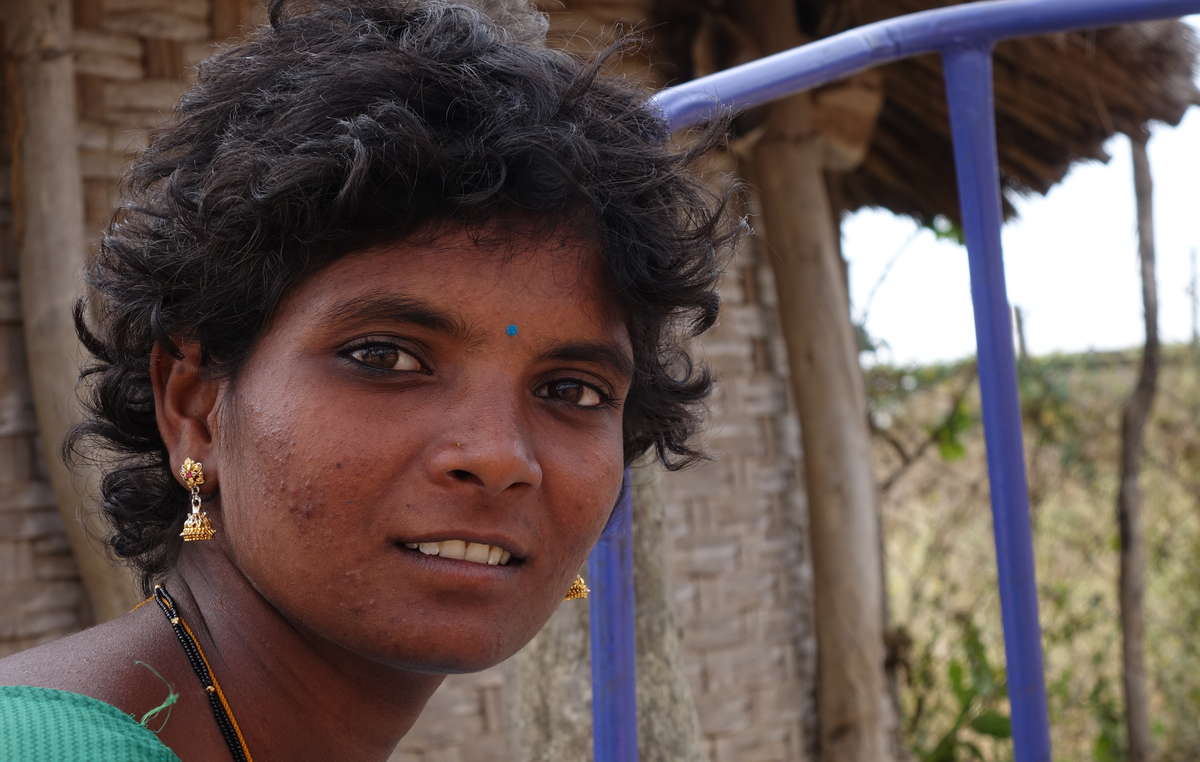
by Deep Green Resistance News Service | Feb 23, 2019 | Colonialism & Conquest
Featured image: Many tribes, like some Chenchu, have already been evicted after their lands were turned into tiger reserves. Now millions more face eviction. © Survival International
by Survival International
India’s Supreme Court has ordered the eviction of up to 8 million tribal and other forest-dwelling people, in what campaigners have described as “an unprecedented disaster,” and “the biggest mass eviction in the name of conservation, ever.”
The ruling is in response to requests by Indian conservation groups to declare invalid the Forest Rights Act, which gives forest-dwelling people rights to their ancestral lands, including in protected areas. The groups had also demanded that where tribespeople had tried and failed to secure their rights under the Act, they should be evicted.
The groups reportedly include Wildlife First, Wildlife Trust of India, the Nature Conservation Society, the Tiger Research and Conservation Trust and the Bombay Natural History Society.
In an extraordinary move, the national government failed to appear in court to defend the tribespeople’s rights, and the Court therefore ruled in favor of the evictions, which it decreed should be completed by July 27.
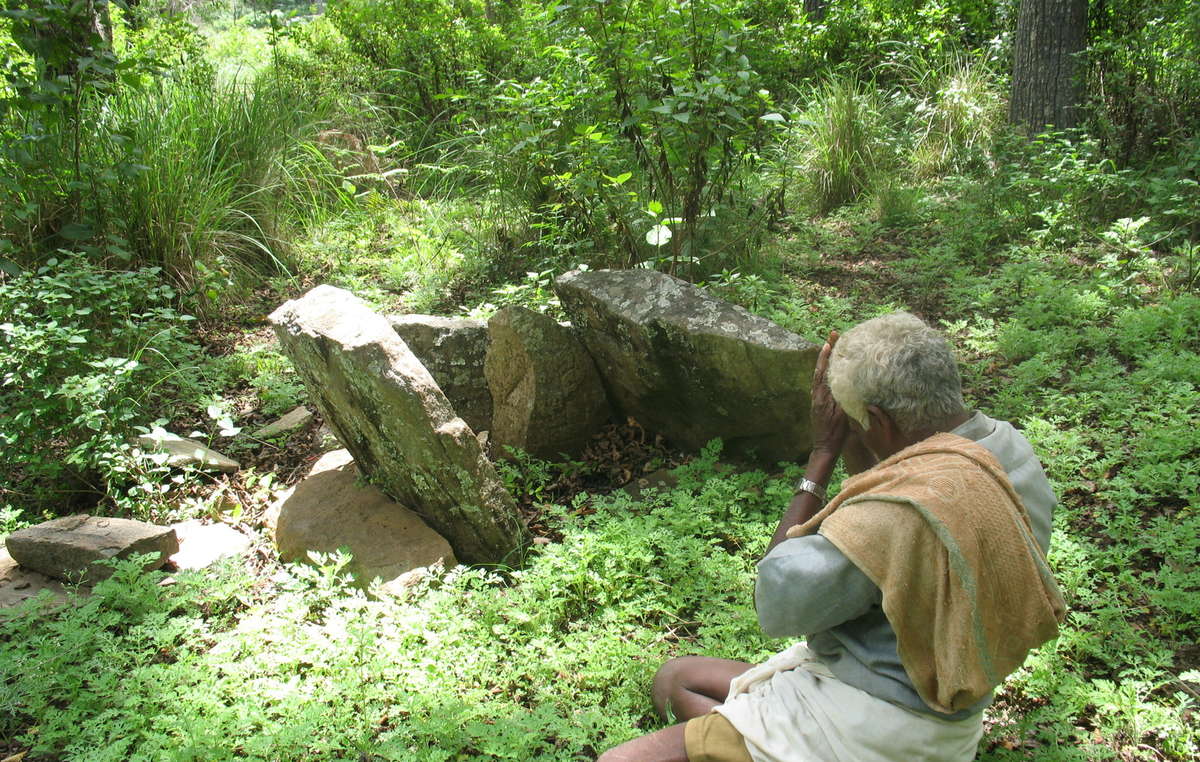
A Soliga man worships at a sacred site, now inside a tiger reserve. © Atree/Survival
The order affects more than 1.1 million households, with experts estimating this could mean more than 8 million individuals will now be evicted – and the number is likely to rise, as some states have not provided details as to how many will be affected.
Survival International’s Director Stephen Corry said today: “This judgement is a death sentence for millions of tribal people in India, land theft on an epic scale, and a monumental injustice.
“It will lead to wholesale misery, impoverishment, disease and death, an urgent humanitarian crisis, and it will do nothing to save the forests which these tribespeople have protected for generations.
“Will the big conservation organizations like WWF and WCS condemn this ruling and pledge to fight it, or will they be complicit in the biggest mass eviction in the name of conservation, ever?”






